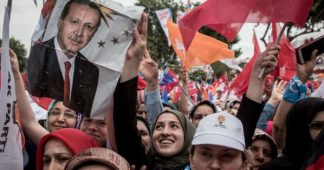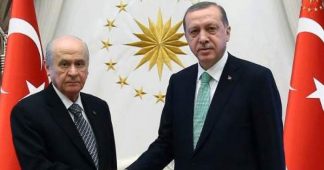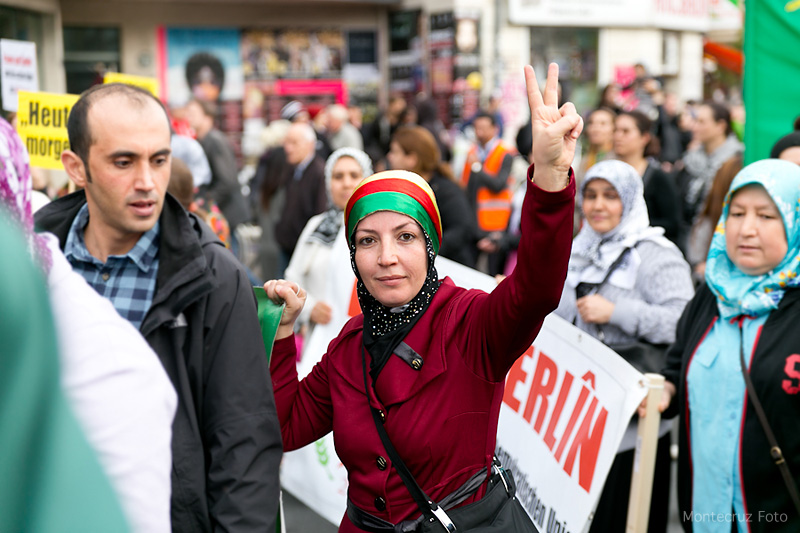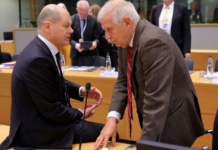By Melkulangara BHADRAKUMAR
25.06.2018
Democratic elections often produce strange outcomes. India’s present government won just 31% of the votes polled in the 2019 parliamentary poll, which had a voter turnout of 66%. In direct elections, it is much more difficult to secure a clear-cut 50% win in the first round for a presidential candidate. Emmanuel Macron’s vote share stood at just 24% in the first round in the French presidential election last year.
Therefore, it is difficult to overstate the significance of the magnificent victory of Recep Erdogan in the Turkish elections on Sunday, securing 52.4% for himself in his bid for the presidency and 53.6% for his party’s electoral alliance in the parliamentary poll. At the most obvious level, Turkey gets a strong, stable government for the coming 5-year period.
Erdogan is a forceful, assertive leader and Sunday’s mandate elevates him to the stature of a Sultan, taking into consideration also the fact that Turkey is entering a system of executive presidency with almost seamless powers vested in it. The comfortable parliamentary majority becomes an added asset. Of course, there is always the fine print and in this case the ruling alliance undoubtedly draws strength from the 11% polled by the Nationalist Movement Party (MHP). This has far-reaching implications.
Quintessentially, what emerges is a right-wing conservative government, both Islamic and nationalistic in orientation. The social democratic platform has visibly shrunk in Sunday’s election, with the vote share of Republican People’s Party securing only a 22.7% signifying a drop in its electoral support. The political, economic and social policies of the new government will reflect this major shift.
Meanwhile, the MHP occupies a strident platform of Turkic nationalism. The party has a consistent record of being uncompromising in regard of the Kurdish problem. Any assumption that in the full flush of victory Erdogan may change course and from a position of strength opt for a policy of dialogue and reconciliation with the Kurdish groups remains debatable. To be sure, MHP will not brook any dilution of the hardline toward Kurdish sub-nationalism and separatism. And it is hard to see Erdogan annoying the MHP or breaking up with the coalition partner in a foreseeable future. Erdogan is a pragmatist but he also understands the nature of the social contract that coasted him to this stunning election victory. MHP votes contributed in no small measure to his own mandate as president. Turkey’s domestic and foreign policies will reflect this political reality.
What is likely to be the foreign policy trajectory of the incoming Erdogan government? Broadly, no major shift can be expected. Erdogan will continue to steer a policy course that focuses on safeguarding and advancing Turkish interests in a difficult regional and international environment. He has a fraught relationship with the western countries. The factors complicating the relationship with the United States are many and not easily resolvable, too. Importantly, the Trump administration cannot have a smooth equation with Erdogan unless and until he makes up with Israel, whereas, he harbors no such intentions. If anything, Erdogan cannot but be aware of the hand of the Jewish lobby in the US in orchestrating the open campaign by the American media and think tanks to vilify him in recent weeks and undermine his campaign as well as the invidious attempts by Wall Street to pile pressure on the Turkish economy, especially the apocalyptic predictions about the fate of the economy if Erdogan won the election. Simply put, so long as Benjamin Netanyahu is in power in Israel, a Turkish-Israeli rapprochement is simply out of the question and the Israeli leader, on his part, will pull all stops to ensure that the US-Turkish relations remain in a state of uncertainty.
However, a break-up with the US is the last thing on Erdogan’s mind. He is not seeking a confrontation with the US or contemplating a walkout from the NATO. Turkey depends heavily on Europe for technology, investment and trade. The Customs Union with the EU is of vital importance for Turkish economy. Again, the Turkish elite’s orientation is traditionally ‘westernist’. In any case, Turkish elite has no desire to get entangled with the Muslim Middle East. Turkey’s relations with Saudi Arabia, the UAE and Egypt remain tense. Erdogan sees that Turkey has both common interests with Iran as well as conflict of interests as an aspiring regional power, but current exigencies dictate the need of cooperation and coordination as much as is possible.
Erdogan will continue to pursue the ‘pivot to the East’ both for balancing his troubled relationship with the West as well as in intrinsic terms. To be sure, what began as an entente with Russia over the situation in northern Syria has already broadened into a full-bodied partnership between the two countries, especially in the economic sphere. Three factors come into play. One, Russia’s ‘soft power’ has been on a steady rising curve in Turkey. The Turkish public opinion increasingly views Russia as a friendly power. Two, the widening transatlantic rift and the overall disarray within the European Union is bound to impact the western alliance system at some point and it inevitably adds to the raison d’etre of Turkey’s ‘pivot-to-East’ strategy. Thus, there is a strong possibility that Turkey may gravitate toward the Eurasian integration processes.
Three, in immediate terms, Turkey has an imperative need to work closely with Russia with regard to the situation in Syria. There are challenges here insofar as aside the complexities of the Kurdish question, Turkey is basically an unsatiated power with a perennial grouse that the Treaty of Sevres (1920) was the beginning of its dismemberment. The ideologues of the MHP (Erdogan’s coalition partner), in particular, continue to regard the terms of the 1920 treaty with hostility as a historical injustice to the Turkic nation. Suffice to say that on the one hand Turkey has deep-rooted suspicions regarding the US intentions, while on the other hand Turkey remains intensely conscious about the geopolitical reality that Russia wields decisive influence in shaping the future of Syria.
The bottom line is that Erdogan has been a lone ranger but with Russian President Vladimir Putin, he has striven to develop a personal relationship. It comes as no surprise if he sees in the Russian leader a man of history in a kindred spirit who tenaciously works for his country’s interests. Most certainly, among the major powers, it is only Putin who has offered to Erdogan an equal partnership. His notional partners within the western alliance system have only poured scorn on him and marginalized him. It was so patently obvious that the western analysts were hoping against hope till the last minute as the election results from Turkey were pouring in that Erdogan would lose. The stakes are so high. Turkey’s independent foreign policies under Erdogan pose a formidable obstacle to the western hegemony in the Greater Middle East.
Published at https://www.strategic-culture.org/news/2018/06/25/what-erdogan-big-victory-in-turkish-elections-means.html











